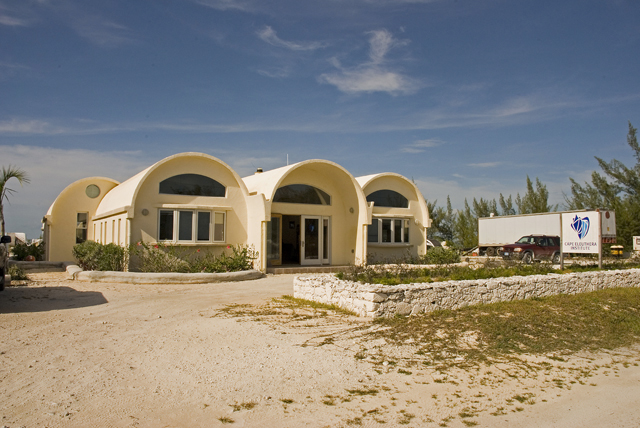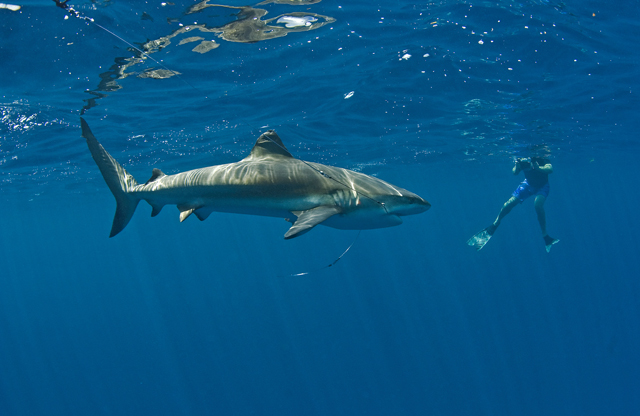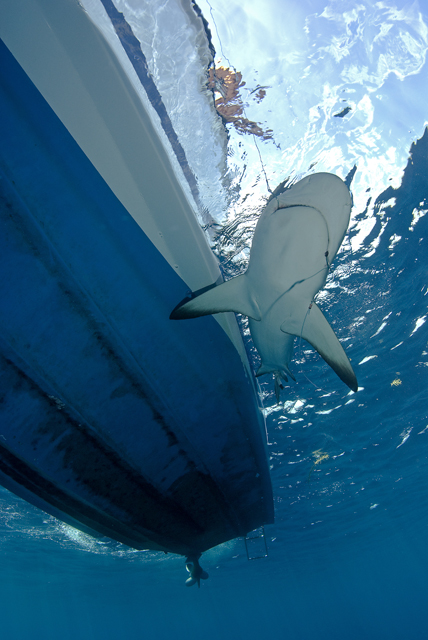Marine Life & Conservation
Our Future
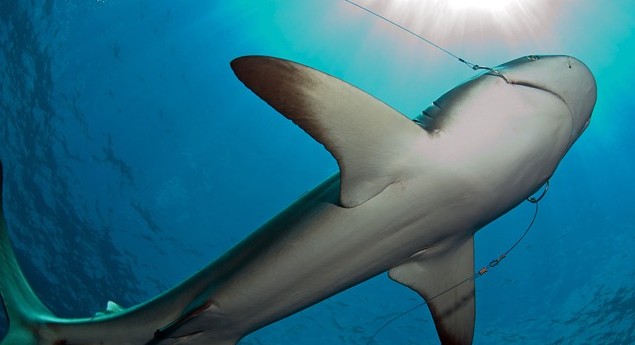
Concerns about natural resources and diminishing food supplies is at the forefront of every conscientious mind. But not everyone is taking a back seat view.
The Cape Eleuthera Foundation has been set up as a school and research institute exploring, improving and putting into practice natural ways of living and existing from our environment. Research Associate, Edd Brooks, said ‘our goal is to be 100% waste-free’. I was surprised to find such an interesting and worthwhile facility hidden away on Eleuthera, a remote island in the Bahamas, more famous for its links with Mariah Carey’s wedding rather than ecological breakthroughs.
The Foundation’s philosophy is to develop and build a number of systems that can sustain a community using only natural resources whilst minimising negative environmental impact. So in a nutshell, they have gone totally ‘green’ and are producing all their own food by aqua/agricultural means and then recycling any waste products to produce more food. It’s basically a closed loop system. 100% of all their power, for heating and lighting, is produced from Solar Energy and Wind Turbines. Bio Diesel (Vegetable Oil) is used to fuel any transportation, i.e. boats and trucks. Water for drinking and sanitation is captured from rainwater and 75% of the wood they’ve used to build the campus was grown from Casuarina Trees, an invasive species most people just disregard and burn.
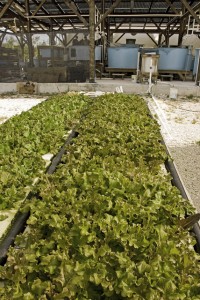
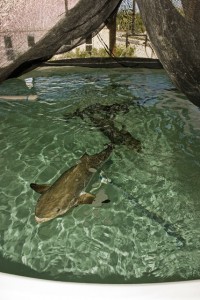 Surely this kind of research and development centre is where our future lies? Students from all over the world come and stay at the facility to conduct project work for schools, colleges and university degrees. Visiting Researchers and Scientists have a complete working laboratory at their disposal. This is the perfect environment for kids looking at careers in marine biology and related topics. It’s purely a ‘not for profit’ educational and research lab. Students and Researchers have to pay for the privilege but where better to conduct studies than a giant outdoor workshop in the Bahamas! Donations from privately owned businesses and organisations help support any new equipment purchases and building expansions.
Surely this kind of research and development centre is where our future lies? Students from all over the world come and stay at the facility to conduct project work for schools, colleges and university degrees. Visiting Researchers and Scientists have a complete working laboratory at their disposal. This is the perfect environment for kids looking at careers in marine biology and related topics. It’s purely a ‘not for profit’ educational and research lab. Students and Researchers have to pay for the privilege but where better to conduct studies than a giant outdoor workshop in the Bahamas! Donations from privately owned businesses and organisations help support any new equipment purchases and building expansions.
The Campus itself is basically split into two areas. The research centre has two 12-bed dormitories, timber framed classrooms, a common area, kitchen/catering facilities and gardens. The school has two wings. Each can accommodate up to 12 students. There is also a computer room, library, presentation rooms and wet and dry labs for research work. All within a stone’s throw of the sea.
A brand new Diving Centre has just been completed. It’s based in an impressive wooden building by the jetty. They also have 6 boats ranging from 19ft-40ft and 24 Sea Kayaks, used for 9-day school expeditions that circumnavigate the southern tip of Eleuthera.
There are about a dozen ongoing research programmes revolving around the marine environment. Aquaculture is the largest and most important ongoing project. Present worldwide fishing quotas are well exceeding regenerative capabilities (we have approx 50 years of wild fish stocks left). Although not a new concept, Aquaculture (fish farming) may well be the key. The first task is to find a species of fish that grows fast and doesn’t eat too much in the process. It also needs to be resilient to infection and disease. Cobia (Rachycentron canadum) is a pelagic species that grows up to 2m in length and can weigh as much as 68kg. It has a high food conversion ratio of 1kg of body mass for every 1.3kg of food it eats. The firm, white flesh is also very tasty and has become extremely popular in restaurants (prices are around $10-00 per kilo).
In 2003 the Institute began building a massive 3,000 metre/squared holding cage for the Cobia. The metal framework was positioned in 30 metres of water 1.5 miles off the coast by the Exuma Sound. This area is known to have reasonably strong currents and waves. Constant water movement helps prevent algae growth, which in turn reduces the risk of disease and parasites. Some of the young fish were lost in transit but around 10,000 fingerlings made it to the cage. Through 2005 the fish grew rapidly. Divers performed regular maintenance checks twice daily, cleaning away algae and taking out any dead or diseased fish. Fish mortalities were mainly due to poor quality feed. Then a Hurricane struck the island. Divers couldn’t get out to clear away the dead fish, which in turn, attracted the predators. Bull Sharks bit through the nets to get to the dead fish. More than 75% of the Cobia crop escaped through the holes. It was also a little disconcerting for the divers when they came face to face with a hungry Bull Shark inside the cage!
Later this year they will introduce a batch of home grown Cobia to the holding cage. To combat the Shark problem they have set up their own artificial ‘eco-system’ inside the cage. Groupers will eat any sick or dying fish before the Sharks are attracted and Gobies and Shrimp will act as cleaning stations to keep fish healthy.
Bonefish (Albula volpes) mortality rates is another high profile research project at the Institute. Florida Bonefish are a highly sought after, premier game fish that annually generates several billion dollars of revenue. Pound for pound they are known to be the best fighting fish in the ocean. They can grow up to 104cm in length and weigh 10kg. It’s mainly caught for sport and then released. The flesh itself isn’t considered to be very tasty. The Bonefish lives in shallow inshore tidal flats and co-exists with its main predator, the juvenile Lemon Shark. Part of the project is looking at the impact catch-and-release angling is having on the mortality rate of Bonefish. It’s been found that the stressed Bonefish are releasing a chemical that the Lemon Sharks are ‘homing in’ on. Once Students have identified this chemical handling and release methods can be adapted to stop the fish getting stressed.
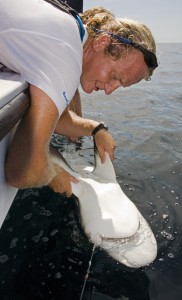
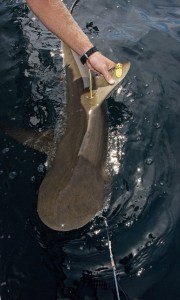 Edd’s primary research project involves monitoring the diminished Shark populations in the Bahamas. There has been a huge amount of worldwide media coverage highlighting the current plight of Sharks. Hundreds of thousands of Sharks are being slaughtered each year just for their fins. The Bahamas totally banned commercial Shark fishing in 2004. Long lining was also banned way back in 1993. But ‘local’ Shark numbers are still declining. Edd thinks the majority of Bahamian Sharks make long migrations into other territorial waters where they might not be protected. This specifically affects species like Tigers, Oceanics and Hammerheads. There is also the possibility that coastal tourism development is having an impact on Shark nurseries and inevitably this has a knock-on effect.
Edd’s primary research project involves monitoring the diminished Shark populations in the Bahamas. There has been a huge amount of worldwide media coverage highlighting the current plight of Sharks. Hundreds of thousands of Sharks are being slaughtered each year just for their fins. The Bahamas totally banned commercial Shark fishing in 2004. Long lining was also banned way back in 1993. But ‘local’ Shark numbers are still declining. Edd thinks the majority of Bahamian Sharks make long migrations into other territorial waters where they might not be protected. This specifically affects species like Tigers, Oceanics and Hammerheads. There is also the possibility that coastal tourism development is having an impact on Shark nurseries and inevitably this has a knock-on effect.
Around ten times a month Edd sets a buoyed long line with around 30 baited hooks. After one and a half hours the line is hauled in and any Sharks caught are recorded, tagged and released. Some are fitted with simple acoustic tracking devices. Edd surgically implants the small transmitters inside the Sharks. Edd has also placed compact VR2 receivers (Hydrophones) at certain points around Eleuthera. These listen out for any ultrasonic pings coming from the tagged Sharks. The recorded information is then downloaded onto his Computer back at base. The receiver records the time stamp and the ID number of the Shark as it passes. He can see any repetitive patterns and habitual movements that are forming. This year Edd is mainly focusing on the benefits of using baited remote underwater video surveys (BRUVS) to check on Shark numbers instead of long lining. BRUVS are far less stressful for the Sharks as there is no direct contact. His research will hopefully be used as a basis for other studies. Monitoring these movements will provide information on critical periods in Shark development so guidelines/restrictions can be put in place to protect the Sharks habitat.
Other current marine related projects include the population recovery of the Spiny Sea Urchin (Diadema antillarum), Patch Reef preservation, Lionfish surveys, Aquaponics for growing plants and restoration of the now thriving Wetland area.
It’s a known fact that our natural resources are running out fast. In the next few decades any studies made by R & D facilities like the Institute are going to be invaluable. Their findings may well be shaping our future. Long term it looks as though we could all be in for a bumpy ride.
Information
Edd is putting together a Shark tagging/research programme for visiting divers. This will give them a chance to go out on the boats, bait the lines, tag the Sharks and basically find out more about Shark ecology. They will also get a tour of the institute and presentations about ongoing research projects. The lucky one’s might even get a homegrown banana from the ‘poo’ garden!
Contact Details
Website: www.ceibahamas.org
E-mail: info@ceibahamas.org
Tel: 609 945 0710
More Information
Website: www.islandschool.org
Website: www.dcmsbahamas.org
Website: www.capeeleutherafoundation.org
Marine Life & Conservation
Paul Watson Released as Denmark Blocks Japan’s Extradition Bid

Renowned anti-whaling activist Paul Watson has been released from custody in Greenland after spending five months in detention. Denmark’s Justice Ministry rejected Japan’s request for his extradition, citing insufficient guarantees that his time already served in custody would be credited against any potential sentence.
The 74-year-old Canadian-American was arrested on July 21 in Nuuk, Greenland’s capital, when his ship docked to refuel. His arrest was based on a 2012 Japanese warrant related to a 2010 encounter in Antarctic waters. Japan alleged Watson obstructed operations and caused damage to a whaling research ship during efforts to disrupt illegal whaling. Watson has consistently denied these claims, maintaining his commitment to marine conservation.
Denmark, which oversees extradition matters for Greenland, concluded that while the legal conditions for extradition were met, the lack of assurances from Japan regarding time-served credit made extradition untenable.
In a video shared by his foundation, Watson expressed gratitude and relief, saying, “After five months, it’s good to be out… and good to know they’re not sending me to Japan.” He added that the most difficult part of his time in custody was being separated from his two young sons.
Watson is a pioneering figure in marine conservation, known for founding the Captain Paul Watson Foundation in 2022 after decades of activism with the Sea Shepherd Conservation Society. His bold efforts to defend marine life have earned him widespread support, including from celebrities and conservationists. His work has also been featured in the acclaimed reality TV series Whale Wars.
Watson’s lawyer, Jonas Christoffersen, praised the decision, stating, “We are happy and relieved that Paul Watson is now free.” He added that Watson is eager to reunite with his family and continue his vital work.
The arrest occurred while Watson’s vessel, the M/Y John Paul DeJoria, was en route to the North Pacific with a team of 26 volunteers to intercept a Japanese whaling ship. His foundation described the arrest as politically motivated and emphasized that Watson’s actions were focused on ending illegal whaling practices.
Japan resumed commercial whaling in 2019 after leaving the International Whaling Commission, asserting that whale meat is a cultural tradition. Conservationists, however, continue to challenge these practices, highlighting their impact on marine ecosystems.
Despite the challenges, Watson remains steadfast in his mission to protect marine life and bring attention to whaling practices. His dedication to ocean conservation has made him a globally respected advocate for the environment.
Marine Life & Conservation
12 Days of Zero-Waste Fish-mas

This holiday period, the Marine Conservation Society, the UK’s leading ocean membership charity, invites you to make some simple changes to eating fish this Christmas to help our seas.
Dr Kenneth Bodles, Head of Fisheries and Aquaculture at the Marine Conservation Society, said, “During the festive season, our consumption increases, but so does waste. Sustainability isn’t just about where food comes from – it’s also about how you use it. By reducing waste and making the most out of your seafood, you’re not only taking steps to be more ocean-friendly, but can also help to cut costs during what is often one of the most expensive times of the year”.
The Marine Conservation Society has compiled twelve tips on how to consume seafood sustainably with zero-waste this Christmas:
Buy whole fish instead of fillets
Instead of fillets, consider buying whole fish such as salmon, hake, or lemon sole. By adopting a “nose to tail” approach with cooking, whole-baked fish not only feeds a crowd, but also helps to minimise waste and maximise sustainability by using up every part of the animal, including bones, skin, and fat.
Make fish stock
Leftover fish bones or shells can be put to good use by boiling them to make a nourishing fish stock or bisque. This can be frozen and preserved for later use and makes for a flavourful base in a soup.
Make your own fish pâté
Avoid waste by turning leftover fish, such as smoked mackerel or salmon, into a delicious pâté by blending with cream cheese and lemon. Perfect when paired with crackers.
The sustainability of salmon and mackerel varies depending on where and how it is caught or farmed. For more information on green-rated options, check the charity’s Good Fish Guide.
Buy frozen
By purchasing seafood that is frozen or vacuum-packed, this helps to reduce waste by extending the shelf life of your food.
Fish pie
If you’re wondering what to do with leftover cooked fish, why not opt for a classic fish pie with mashed potatoes, leeks, and a cheesy sauce? A sure crowd pleaser on Boxing Day.
Use the head
Don’t forget the fish head! The meat is incredibly tender and flavourful. The charity recommends a cod’s head curry or recreating Fallow’s renowned cod’s head in siracha butter.
By stretching your ingredients further, not only is this a more sustainable way to enjoy seafood, but also cost-effective by repurposing leftovers and cooking creatively.
Boxing Day brunch
Mix leftover kippers or smoked salmon with scrambled eggs for a tasty, zero-waste, Boxing Day brunch.
For best choice, make sure you buy kippers, or herring, from the North Sea and the North Irish Sea.
Zero-waste storage
A top tip from the Marine Conservation Society to avoid waste is freezing fish offcuts to save for future use.
Crisp up the skin
Even leftover fish skin can be turned into a quick savoury snack by crisping it up in an air fryer with a little olive oil and salt.
Anchovies two ways
Leftover anchovies can either be blended with butter to make a delicious anchovy butter or tossed into pasta for a hit of umami flavour.
The charity recommends opting for anchovies caught in the Bay of Biscay for best choice.
Fishcakes
For an easy, zero-waste meal, leftover seafood trimmings can be mixed with mash and fried in breadcrumbs to make fishcakes.
Pickled mussels
Try pickling mussels in 1:1 vinegar and water, with a dash of sugar for a sustainable, zero-waste snack that can be enjoyed well beyond the festive season.
Mussels farmed in the UK are a seafood superhero. Grown using low-impact methods and harvested by hand, they get all the food they need from the sea around them. This makes them one of the most sustainable, ocean-friendly, and cost-effective seafood options.
Players of People’s Postcode Lottery have raised £6.6M towards the Marine Conservation Society’s vital work in making seafood more sustainable.
Laura Chow, Head of Charities at People’s Postcode Lottery, said: “Fish is a festive favourite for many, but making sustainable choices when it comes to how we buy and eat seafood makes all the difference for our ocean. Support from players of People’s Postcode Lottery has helped the Marine Conservation Society further its sustainable seafood work, so that we can all enjoy healthier, better protected seas.”
The Marine Conservation Society encourages you to make sustainable seafood choices a year-round habit, not just for Christmas. To check how sustainable the seafood on your plate is, you can visit the charity’s Good Fish Guide. The Guide helps consumers and businesses identify the most sustainable seafood using a simple traffic light system, based on where and how species are caught or farmed. Green is the best choice, amber means improvements are needed, and red indicates fish to avoid buying.
Zero-waste gift idea
Why not embrace a zero-waste Christmas by gifting a membership to support marine conservation? It’s a meaningful, low-waste gift that helps protect our ocean for generations to come. Memberships start from as little as £5 a month – the price of a sandwich and drink from your local coffee shop.
Find the latest sustainable seafood advice for wild-caught and farmed seafood on the Good Fish Guide, downloadable to your phone from www.mcsuk.org/goodfishguide.
-

 News2 months ago
News2 months agoIconic SS United States to become the World’s Largest Artificial Reef
-

 News3 months ago
News3 months agoBook Review – 52 Assignments: Underwater Photography
-

 Gear News3 months ago
Gear News3 months agoDYNAMICNORD – New German diving brand enters the British market
-

 News3 months ago
News3 months agoExploring Cenote El Pit: A Diver’s Dream
-

 Gear News3 months ago
Gear News3 months agoTry BARE drysuits (and maybe even win one!) this Friday with Sea & Sea at North West Dive Fest
-

 Marine Life & Conservation3 months ago
Marine Life & Conservation3 months agoBook Review: Coral Triangle Cameos
-

 Blogs2 months ago
Blogs2 months agoDive the Egyptian Red Sea this Autumn with Regaldive
-

 News3 months ago
News3 months ago2024 Ocean Art Underwater Photo Competition Announced


